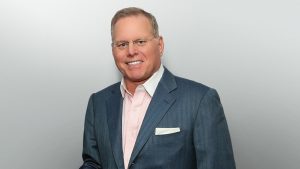
After more than 40 years of operation, DTVE is closing its doors and our website will no longer be updated daily. Thank you for all of your support.
Warner Bros. Discovery’s Zaslav: bundling is back

David Zaslav
Streaming is a “bit challenged” as a market and a return to bundling could be the way forward, according to Warner Bros. Discovery president and CEO David Zaslav.
Speaking at the Goldman Sachs Communacopia and Technology conference, Zaslav said that the old model of cable bundling was “a good and nourishing experience” for consumers. He said that bundling would return and the current disruption the media business is seeing could “activate a quicker transition to some of us in the content business bundling together to create a better consumer experience,” he said.
He said WBD had experimented in this direction by putting all of AMC’s content on combined streamer Max for the next 60 days to see whether it enabled AMC to grow its own consumer product.
Zaslav indicated that the prices charged for big streaming products needed to be recalibrated, and that putting more into the ‘streaming bundle’ could enable the company to charge more.
“Price has come down for premium content, but investment has gone up,” he said. Adding quality content to Max would enable the company to “move on price” he said. “When we have raised prices the loss to us has been very minimal,” he said.
Zaslav said that WBD’s new combined streamer Max is “able to support all of our entertainment and nonfiction content” and would be rolled out globally this year and next.
He said engagement was up and the appetite for a broader mix of content seemed to exist. He said the company now had 95+ million homes on Max.
On the advertising business, he said that WBD got paid for 25–54-year-olds for a media where 70% of the audience was older. To deliver advertising on the digital platform produced higher CPMs and payment for everyone who views the content, not just for the core demographic.
“We need to grow Max ad-lite,” he said. “We get big audiences and no-one has been able to advertise inside of an HBO show. We need to take advantage of that.”
Internationally, he said, WBD was seeing more improvement in advertising compared with the US market.
CNN Max launch
Turning to another recent topic, Zaslav said the launch of CNN Max was a big moment. “When you are on Max…you can also tune to live news and if something is happening in the world you will see it,” he said.
He said sport would also be added to Max, with more details to come. Zaslav said that “sport is a big advantage to us” and he believes the combination would work.
“We have offered sports in different ways. In Europe it is mostly offered as an add on,” he said. In th US, sport is bundled in but the cost of sports has increased, leading to many distributors saying they would “do without it”, he said.
It was possible that a national sports streaming platform would shift the market, said Zaslav. He would not however be drawn on whether WBD would offer sport on an à la carte basis, saying that the bundling of news and sports “worked well”.
On the renewal of a rights agreement with the NBA, Zaslav said he “would like to have this” but added that WBD was very much focused on cash flow and its balance sheet. “We are not going to sacrifice the health of the company…for any IP,” he said.
Zaslav said that CNN Max would be “a live product” above all. Max’s demographic was about “30 years younger than for linear TV” so creating a live news service for people who do not consume linear TV is compelling.
Zaslav said that CNN was the number one digital site for news globally. He said putting that together with sports and other news content was something the company would work out with Mark Thompson in charge, with subscription and free elements to be worked out.
Strikes’ impact
On the impact of the Hollywood actors and writers strikes, which this week forced the company to downgrade its earnings expectations for the year, Zaslav said the strike was “really about people…who have been out for a very long time”. He said people “need to be compensated fairly and to feel valued”.
He said that it was “unusual” to have strike that lasts so long, something that had not happened.
He said he was hopeful that the strike would be resolved but added that “there are real industry challenges” and that the industry had not recovered from COVID, particularly on the production side of the business.
On Disney’s dispute with Charter Communications, Zaslav said that he did not “know much” but said that WBD had been focused on restructuring the business for the world as it is today. He said the company had seen solid results after 16 months and had “real command and control” over its businesses.
Zaslav said that WBD’s balance sheet was now deleveraged and was focused on “sustainable growth”.
The said the industry “is being disrupted” calling for “difficult decisions” to make it a viable business in the future.
Zaslav said people were still spending time oin linear channels, particularly the over 40s, and said he “still believes in linear”.
Referring to the success of Barbie, Zaslav said WBD also needed to make the most of its IP, for example by reviving franchises such as Harry Potter and Lord of the Rings for the streaming age.


